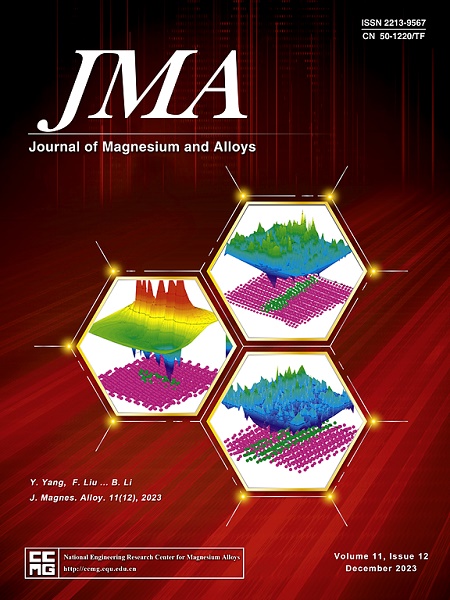Shortening the manufacturing process of degradable magnesium alloy minitube for vascular stents by introducing cyclic extrusion compression
IF 15.8
1区 材料科学
Q1 METALLURGY & METALLURGICAL ENGINEERING
引用次数: 0
Abstract
Due to its excellent biocompatibility and biodegradability, Mg and its alloys are considered to be promising materials for manufacturing of vascular sent. However, the manufacture of high-precision and high-performance Mg alloys minitubes is still a worldwide problem with a long manufacturing processing caused by the poor workability of Mg alloys. To solve this problem, the cyclic extrusion compression (CEC) was used to pretreat the billet by improving the workability of Mg alloys, finally shortening the manufacturing process. After CEC treatment, the size of grains and second phase particles of Mg alloys were dramatically refined to 3.2 µm and 0.3 µm, respectively. Only after three passes of cold drawing, the wall thickness of minitube was reduced from 0.200 mm to 0.135 mm and a length was more than 1000 mm. The error of wall thickness was measured to be less than 0.01 mm, implying a high dimensional accuracy. The yield strength (YS), ultimate tensile strength (UTS) and elongation of finished minitube were 220±10 MPa, 290±10 MPa and 22.0 ± 0.5%, respectively. In addition, annealing can improve mechanical property and corrosion resistance of minitubes by improving the homogeneity of the microstructure and enhancing the density of basal texture.
引入循环挤压压缩,缩短血管支架用可降解镁合金微管的制造工艺
由于具有良好的生物相容性和生物降解性,镁及其合金被认为是制造血管的理想材料。然而,由于镁合金的可加工性较差,制造高精度、高性能的镁合金微型管仍是一个世界性难题,而且制造过程较长。为了解决这个问题,我们采用了循环挤压压缩(CEC)技术,通过改善镁合金的可加工性对坯料进行预处理,最终缩短了制造流程。经过 CEC 处理后,镁合金的晶粒和第二相颗粒尺寸分别大幅细化至 3.2 µm 和 0.3 µm。仅经过三次冷拔,微型管的壁厚就从 0.200 毫米降至 0.135 毫米,长度超过 1000 毫米。经测量,壁厚误差小于 0.01 毫米,这意味着尺寸精度很高。成品微型管的屈服强度(YS)、极限拉伸强度(UTS)和伸长率分别为 220±10兆帕、290±10兆帕和 22.0±0.5%。此外,退火还能改善微观结构的均匀性,提高基底纹理的密度,从而提高微型管的机械性能和耐腐蚀性。
本文章由计算机程序翻译,如有差异,请以英文原文为准。
求助全文
约1分钟内获得全文
求助全文
来源期刊

Journal of Magnesium and Alloys
Engineering-Mechanics of Materials
CiteScore
20.20
自引率
14.80%
发文量
52
审稿时长
59 days
期刊介绍:
The Journal of Magnesium and Alloys serves as a global platform for both theoretical and experimental studies in magnesium science and engineering. It welcomes submissions investigating various scientific and engineering factors impacting the metallurgy, processing, microstructure, properties, and applications of magnesium and alloys. The journal covers all aspects of magnesium and alloy research, including raw materials, alloy casting, extrusion and deformation, corrosion and surface treatment, joining and machining, simulation and modeling, microstructure evolution and mechanical properties, new alloy development, magnesium-based composites, bio-materials and energy materials, applications, and recycling.
 求助内容:
求助内容: 应助结果提醒方式:
应助结果提醒方式:


